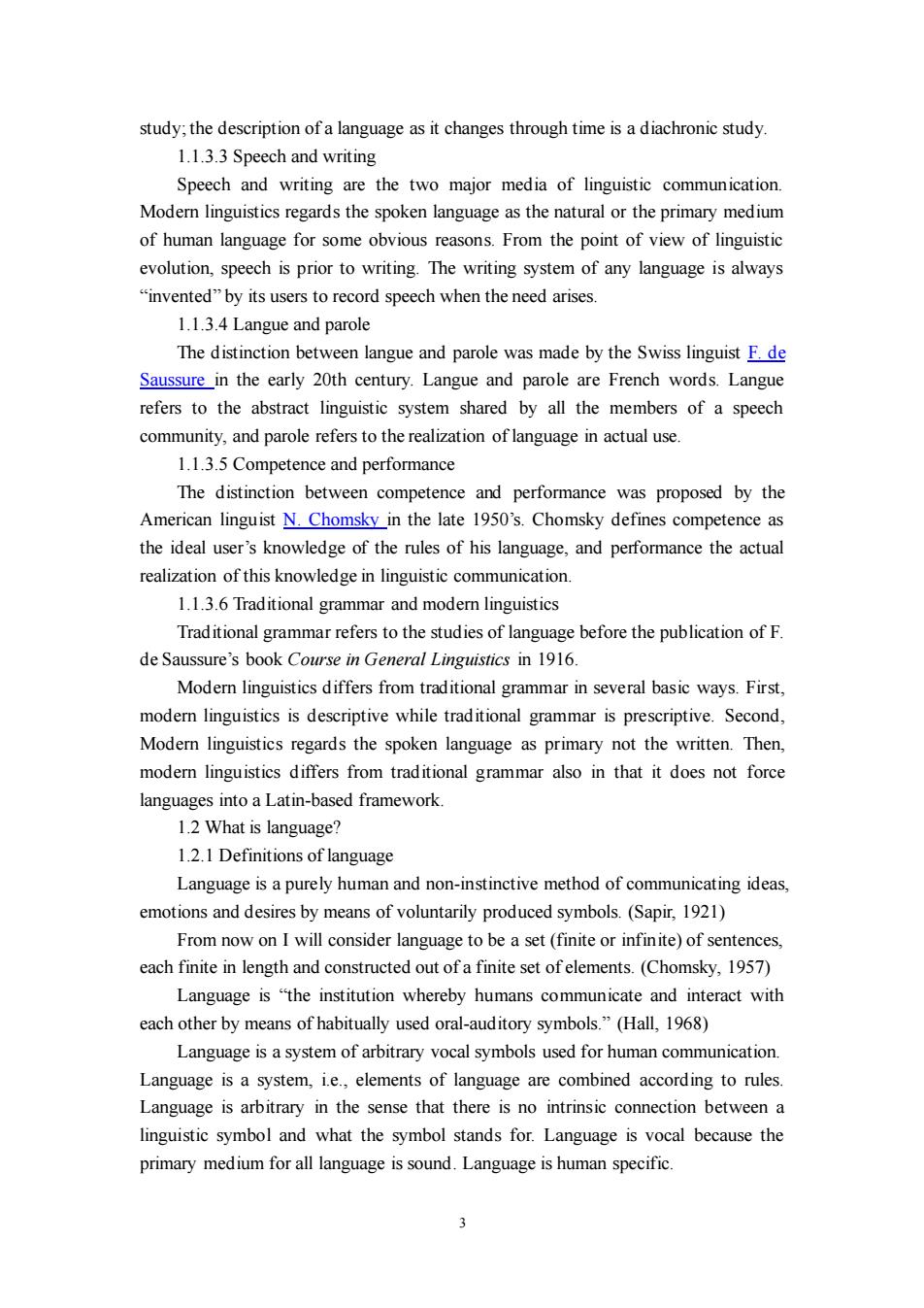正在加载图片...

study:the description of a language as it changes through time is a diachronic study 1.1.3.3 Speech and writing Speech and writing are the two major media of linguistic communication Modern linguistics regards the spoken language as the natural or the primary medium of human language for some obvious reasons.From the point of view of linguistic evolution.speech is prior to writing.The writing system of any language is always "invented"by its users to record speech when the need arises. 1.1.3.4 Langue and parole The distinction between langue and parole was made by the Swiss linguist F.de Saussure in the early 20th century.Langue and parole are French words.Langue refers to the abstract linguistic system shared by all the members of a speech community,and parole refers to the realization of language in actual use. 1.1.3.5 Competence and performance The distinction between competence and performance was proposed by the American linguist N.Chomsky_in the late 1950's.Chomsky defines competence as the ideal user's knowledge of the rules of his language,and performance the actual realization of this knowledge in linguistic communication. 1.1.3.6Traditional grammar and moder linguistics Traditional grammar refers to the studies of language before the publication of F. de Saussure's book Course in General Linguistics in 1916 Modern linguistics differs from traditional grammar in several basic ways.First, modem linguistics is descriptive while traditional grammar is prescriptive.Second Modern linguistics regards the spoken language as primary not the written.Then, modern linguistics differs from traditional grammar also in that it does not force languages into a Latin-based framework. 1.2 What is language? 1.2.1 Definitions of language Language is a purely human and non-instinctive method of communicating ideas, emotions and desires by means of voluntarily produced symbols.(Sapir,1921) From now on I will consider language to be a set (finite or infinite)of sentences each finite in length and constructed out ofa finite set ofelements.(Chomsky,1957) Language is "the institution whereby humans communicate and interact with each other by means of habitually used oral-auditory symbols."(Hall,1968) Language is a system of arbitrary vocal symbols used for human communication. Language is a system,ie.,elements of language are combined according to rules Language is arbitrary in the sense that there is no intrinsic connection between a linguistic symbol and what the symbol stands for.Language is vocal because the primary medium for all language is sound.Language is human specific.3 study; the description of a language as it changes through time is a diachronic study. 1.1.3.3 Speech and writing Speech and writing are the two major media of linguistic communication. Modern linguistics regards the spoken language as the natural or the primary medium of human language for some obvious reasons. From the point of view of linguistic evolution, speech is prior to writing. The writing system of any language is always “invented” by its users to record speech when the need arises. 1.1.3.4 Langue and parole The distinction between langue and parole was made by the Swiss linguist F. de Saussure in the early 20th century. Langue and parole are French words. Langue refers to the abstract linguistic system shared by all the members of a speech community, and parole refers to the realization of language in actual use. 1.1.3.5 Competence and performance The distinction between competence and performance was proposed by the American linguist N. Chomsky in the late 1950’s. Chomsky defines competence as the ideal user’s knowledge of the rules of his language, and performance the actual realization of this knowledge in linguistic communication. 1.1.3.6 Traditional grammar and modern linguistics Traditional grammar refers to the studies of language before the publication of F. de Saussure’s book Course in General Linguistics in 1916. Modern linguistics differs from traditional grammar in several basic ways. First, modern linguistics is descriptive while traditional grammar is prescriptive. Second, Modern linguistics regards the spoken language as primary not the written. Then, modern linguistics differs from traditional grammar also in that it does not force languages into a Latin-based framework. 1.2 What is language? 1.2.1 Definitions of language Language is a purely human and non-instinctive method of communicating ideas, emotions and desires by means of voluntarily produced symbols. (Sapir, 1921) From now on I will consider language to be a set (finite or infinite) of sentences, each finite in length and constructed out of a finite set of elements. (Chomsky, 1957) Language is “the institution whereby humans communicate and interact with each other by means of habitually used oral-auditory symbols.” (Hall, 1968) Language is a system of arbitrary vocal symbols used for human communication. Language is a system, i.e., elements of language are combined according to rules. Language is arbitrary in the sense that there is no intrinsic connection between a linguistic symbol and what the symbol stands for. Language is vocal because the primary medium for all language is sound. Language is human specific